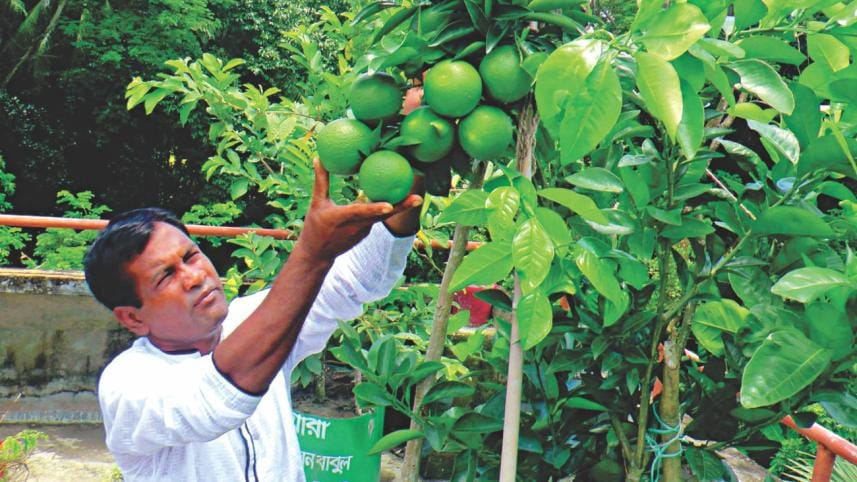Going green

Remote Char Fasson towards the southern tip of Bhola Island is not exactly the sort of place where one might expect to encounter a beautiful rooftop garden. But the teachers and students of Majherchar Primary School in the village of the same name have pursued a 'Green Project', which has involved creating just such a garden on the rooftops of their school.
“All the students are delighted to see our own garden,” says Mohiminul Islam, a class-five student who is also president of the student council leading the project. “We work in the garden every day during free time because we want to. It's a pleasure for us.”
“Tending the garden is just like playing in the playground,” says another student of the same class, Rozina Begum.
“We planted the first trees in the garden in July 2016,” recollects an equally enthusiastic Harun-ur-Rashid, an assistant teacher at the school. “Those trees have borne fruit within a single year!”

Indeed with its growing reputation for rooftop gardening, the primary school is itself becoming more popular among guardians and the community at large. The garden covers the roofs of the school's two, double-storied buildings and features flowers, fruit trees and vegetables. Each specimen is planted in a soil-filled pot or drum.
“Student attendance has increased since we made the garden,” says the school's headmistress, Laki Khanom. “We have fifteen species of fruit including guavas, maltas, mangoes, lemons, oranges, native olives, litchis, grapes and hog plums. There are thirty types of flowers and four kinds of vegetables.” The garden also features ten species of medicinal plants.
“We managed the cost of the garden from our own efforts initially,” the headmistress continues, “but nowadays the chairmen of our own and neighbouring union councils like to contribute too. They have seen how beautiful our garden is.” This season plans are afoot to expand the garden with the support of several local administrations.
“The rooftop garden is an example for all,” says Abdus Salam, the education officer in Char Fasson upazila. “Such praiseworthy work will be followed by many other schools. It was fascinating to see their garden and I have requested all the head teachers in our upazila to visit the garden in Majherchar to see if similar projects can't be pursued at their institutions.”
“The primary school rooftop garden is inspirational,” agrees the upazila's agriculture officer Monotosh Shikder. “Through it, even we can achieve a boost in agricultural production, especially if other schools follow suit.”
Needless to say, the first example in the district of a school rooftop garden has been a roaring success. Schoolteachers are unanimous in praising the initiative which, they say, has greatly improved the school's atmosphere in general, attracting new students and inspiring existing ones. The beauty of Majherchar's garden, it would seem, has helped the beauty of education to blossom there, too.

 For all latest news, follow The Daily Star's Google News channel.
For all latest news, follow The Daily Star's Google News channel.
Comments